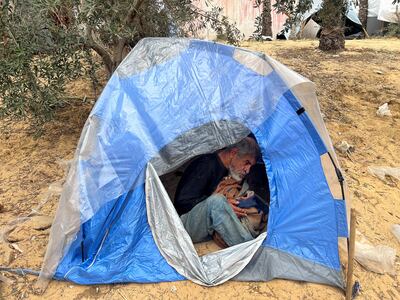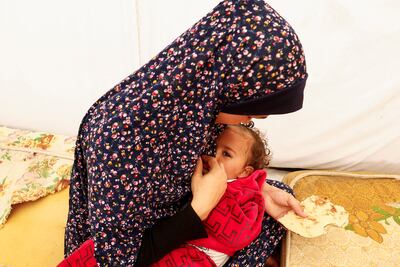Live updates: Follow the latest news on Israel-Gaza
Details on negotiations for a deal on the release of hostages by Hamas and Gaza's postwar future have been revealed by Egyptian officials, including a vow by Hamas to only release captives in small batches.
The latest revelation gives scope to the difficulty its negotiators are facing in contacting field commanders.
Each release, the officials said, could be followed by more if Israel complies with the terms of a deal.
Israel's rejection of Hamas’s demands and its insistence on pressing on with its military operations until it dismantles Hamas’s war machine were mostly to blame for the delay in reaching a deal, officials told The National.
Another cause for the delay is the difficulty encountered by Hamas negotiators in reaching the group's senior field commanders, officials said.
Precise information on where many of the hostages are being held has become hard to ascertain given the large scope of Israel's ground offensive and its continuing bombardment of Gaza, they added.
Gaza has been devastated by a six-week Israeli onslaught that has killed about 13,000 Palestinians, of whom some 5,000 are children, according to the Health Ministry in Gaza.
The negotiations, already complex and fraught with distrust, have been moving at a slow pace since late last week, the officials said, with Israel rejecting outright proposals for several days’ truce to allow substantial humanitarian aid to reach Gaza.
It was also demanding the release of the 240 hostages held by Hamas in Gaza, said the officials.
The negotiations, which have been continuing intermittently for weeks, involve Israel, the US, Egypt, Qatar and, indirectly, Hamas.

Qatari Prime Minister Sheikh Mohammed Bin Abdulrahman Al Thani said on Sunday he had growing confidence that a deal would be reached.
“The challenges facing the agreement are just practical and logistical,” he told a joint news conference with EU foreign policy chief Josep Borrell in Doha.
On Sunday, White House deputy national security adviser Jon Finer said a deal to secure the release of some of the Hamas-held hostages was closer than ever.
“What I can say at this point is that some of the outstanding areas of disagreement, in a very complicated, very sensitive negotiation, have been narrowed,” Mr Finer told NBC's Meet the Press programme.
“I believe we are closer than we have been in quite some time, maybe closer than we have been since the beginning of this process, to getting this deal done,” he added.
The negotiations, the Egyptian officials said, have proceeded on two tracks: one on a deal that addresses short-term issues such as a humanitarian pause and a limited exchange of prisoners, and another that deals with post-hostilities issues including a ceasefire and security and governance arrangements in the coastal enclave.
They said the short-term track included Hamas’s stated willingness to free in batches as many as 100 of the hostages it is holding. Most of those to be released would be women, children and US nationals, they added.
The staggered releases – 20 hostages in each batch – are meant to ensure that Israel honours its part of the deal according to a timeline now under discussion for the implementation of an agreement, said the officials.
In exchange, Hamas wants Israel to release women and children held in Israeli jails, thought to number in the low hundreds.
It also wants a humanitarian pause of three-to-five days allowing the delivery of substantial aid to meet the growing needs of the strip’s 2.3 million people after Israel's relentless bombardment and its near-complete blockade of the territory.

Aid reaching Gaza overland from Egypt since October 21 has been deemed by UN officials as a drop in the ocean given Gaza’s present needs.
Hamas also wants Israel to stop targeting hospitals in the territory, said the officials.
Israel maintains that a truce of that duration would allow Hamas, which it has vowed to annihilate, to regroup and maybe repeat its deadly October 7 rampage in southern Israel that killed about 1,200. It insists that pauses lasting a few hours on routes that could be used for delivering aid should suffice.
The surprise Hamas attack is what triggered Israel’s devastating onslaught in Gaza, which has reduced large swathes of built-up areas to rubble and displaced more than half of Gaza’s population.
Evidencing the distrust in the negotiations is the insistence by Hamas that it would suspend carrying out its part of the deal if Israel fails to honour the timeline for implementing the deal, said the officials.
On the longer-term track, Egypt, which borders both Gaza and Israel, has made a host of proposals for the enclave’s future, said the officials.
They include a gradual process that begins with a full exchange of prisoners between Israel and Hamas, a complete Israeli withdrawal from Gaza and the return home of the hundreds of thousands who were forced to move to southern Gaza from the enclave’s northern areas to escape the violence.

Egypt, which has a 1979 peace treaty with Israel and maintains a working relationship with Hamas, also wants Israel to lift its blockade of Gaza. The deployment in Gaza of an Arab peacekeeping contingent under UN supervision, with Egypt and Jordan given key roles, is another Egyptian idea under discussion, according to the officials.
Israel, however, is insisting on maintaining a military presence in Gaza after the cessation of hostilities because only its military can prevent the re-emergence of Hamas and other militant groups from becoming a potent threat to its security.
Moving forward, Egypt is proposing a joint effort with Qatar to rebuild Gaza and to arrive at a satisfactory arrangement to extract and market natural gas reserves found off Gaza’s Mediterranean coast, with guarantees for the safety of associated infrastructure like offshore rigs and pipelines, said the officials.
Also on the longer-term track is the reconciling of rival Palestinian factions, partially through the election of a new president to replace 88-year-old Mahmoud Abbas.
The information divulged by the Egyptian officials coincided with the denial by Israel and the US of a Washington Post report that a tentative deal between Israel and Hamas on the hostages has been reached.
“Concerning the hostages, there are many unsubstantiated rumours, many incorrect reports,” Israeli Prime Minister Benjamin Netanyahu told a news conference on Saturday night.
“I would like to make it clear: as of now, there has been no deal. But I want to promise – when there is something to say, we will report to you about it.”
A White House representative said Israel and Hamas have not yet reached a deal on a temporary ceasefire. The US is continuing to work to get a deal, he said.


